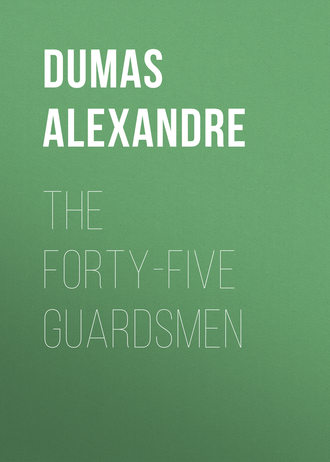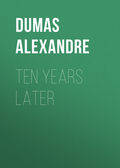
Александр Дюма
The Forty-Five Guardsmen
CHAPTER LXXVI.
THE JOURNEY
They set off. Aurilly affected the most perfect equality with Remy, and showed to Diana the greatest respect. But this respect was very interested. Indeed, to hold the stirrup of a woman when she mounts or dismounts, to watch each of her movements with solicitude, to let slip no occasion of picking up her glove, is the role either of a lover, a servant, or a spy. In touching Diana's glove Aurilly saw her hand, in clasping her cloak he peeped under her mask, and always did his utmost to see that face which the duke had not been able to recognize, but which he doubted not he should be able to. But Aurilly had to deal with one as skillful as himself; Remy claimed to perform his ordinary services to Diana, and seemed jealous of Aurilly, while Diana herself, without appearing to have any suspicions, begged Aurilly not to interfere with the services which her old attendant was accustomed to render to her. Aurilly was then reduced to hoping for rain or sun to make her remove her mask; but neither rain nor sun had any effect, and whenever they stopped Diana took her meals in her own room. Aurilly tried to look through the keyholes, but Diana always sat with her back to the door. He tried to peep through the windows, but there were always thick curtains drawn, or if none were there, cloaks were hung up to supply their place. Neither questions, nor attempts at corruption, succeeded with Remy, who always declared that his mistress's will was his.
"But these precautions are, then, taken only on my account?" said Aurilly.
"No, for everybody."
"But M. d'Anjou saw her; she was not hidden then."
"Pure chance; but it is just because he did see her that she is more careful than ever."
Days passed on, and they were nearing their destination, but Aurilly's curiosity had not been gratified. Already Picardy appeared to the eyes of the travelers.
Aurilly began to lose patience, and the bad passions of his nature to gain the ascendant. He began to suspect some secret under all this mystery. One day he remained a little behind with Remy, and renewed his attempts at seduction, which Remy repulsed as usual.
"But," said Aurilly, "some day or other I must see your mistress."
"Doubtless," said Remy; "but that will be when she likes, and not when you like."
"But if I employ force."
"Try," said Remy, while a lightning glance, which he could not repress, shot from his eyes.
Aurilly tried to laugh. "What a fool I am!" said he; "what does it matter to me who she is? She is the same person whom the duke saw."
"Certainly."
"And whom he told me to bring to Chateau-Thierry."
"Yes."
"Well! that is all that is necessary. It is not I who am in love with her, it is monseigneur; and provided that you do not seek to escape or fly – "
"Do we appear to wish to do so?"
"No."
"And she so little desires to do so, that were you not here we should continue our way to Chateau-Thierry; if the duke wishes to see us, we wish also to see him."
"That is capital," said Aurilly. "Would your mistress like to rest here a little while?" continued he, pointing to a hotel on the road.
"You know," said Remy, "that my mistress never stops but in towns."
"Well, I, who have made no such vow, will stop here a moment; ride on, and I will follow."
Remy rejoined Diana.
"What was he saying?" asked she.
"He expressed his constant desire – "
"To see me?"
"Yes."
Diana smiled.
"He is furious," continued Remy.
"He shall not see me; of that I am determined."
"But once we are at Chateau-Thierry, must he not see your face?"
"What matter, if the discovery come too late? Besides, the duke did not recognize me."
"No, but his follower will. All these mysteries which have so annoyed Aurilly for eight days had not existed for the prince; they had not excited his curiosity or awakened his souvenirs, while for a week Aurilly has been seeking, imagining, suspecting. Your face will strike on a memory fully awakened, and he will know you at once."
At this moment they were interrupted by Aurilly, who had taken a cross-road and come suddenly upon them, in the hope of surprising some words of their conversation. The sudden silence which followed his arrival proved to him that he was in the way, and he therefore rode behind them.
He instinctively feared something, as Remy had said, but his floating conjectures never for an instant approached the truth. From this moment his plans were fixed, and in order to execute them the better he changed his conduct, and showed himself the most accommodating and joyous companion possible during the rest of the day.
Remy remarked this change not without anxiety.
The next day they started early, and at noon were forced to stop to rest the horses. At two o'clock they set off again, and went on without stopping until four. A great forest, that of La Fere, was visible in the distance; it had the somber and mysterious aspect of our northern forests, so imposing: to southern natures, to whom, beyond all things, heat and sunshine are necessary; but it was nothing to Remy and Diana, who were accustomed to the thick woods of Anjou and Sologne. It might have been about six o'clock in the evening when they entered the forest, and after half an hour's journey the sun began to go down. A high wind whirled about the leaves and carried them toward a lake, along the shore of which the travelers were journeying. Diana rode in the middle, Aurilly on the right, and Remy on the left. No other human being was visible under the somber arches of the trees.
From the long extent of the road, one might have thought it one of those enchanted forests, under whose shade nothing can live, had it not been for the hoarse howling of the wolves waking up at the approach of night. All at once Diana felt that her saddle, which had been put on by Aurilly, was slipping. She called Remy, who jumped down, and began to tighten the girths. At this moment Aurilly approached Diana, and while she was occupied, cut the strings of silk which fastened her mask. Before she had divined the movement, or had time to put up her hand, Aurilly seized the mask and looked full at her. The eyes of these two people met with a look so terrible, that no one could have said which looked most pale and menacing. Aurilly let the mask and his dagger fall, and clasping his hands, cried, "Heavens and earth! Madame de Monsoreau!"
"It is a name which you shall repeat no more," cried Remy, seizing him by the girdle and dragging him from his horse. Both rolled on the ground together, and Aurilly stretched out his hand to reach his dagger.
"No, Aurilly, no," said Remy, placing his knee on his breast.
"Le Haudoin!" cried Aurilly; "oh, I am a dead man!"
"That is not yet true, but will be in a moment," cried Remy; and drawing his knife, he plunged the whole blade into the throat of the musician.
Diana, with haggard eyes, half turned on her saddle, and leaning on the pommel, shuddering, but pitiless, had not turned her head away from this terrible spectacle. However, when she saw the blood spurt out from the wound, she fell from her horse as though she were dead.
Remy did not occupy himself with her at that terrible moment, but searched Aurilly, took from him the two rouleaux of gold, then tied a stone to the neck of the corpse, and threw it into the lake. He then washed his hands in the water, took in his arms Diana, who was still unconscious, and placed her again on her horse. That of Aurilly, frightened by the howling of the wolves, which began to draw nearer, had fled into the woods.
When Diana recovered herself, she and Remy, without exchanging a single word, continued their route toward Chateau-Thierry.
CHAPTER LXXVII.
HOW KING HENRI III. DID NOT INVITE CRILLON TO BREAKFAST, AND HOW CHICOT INVITED HIMSELF
The day after the events that we have just related had taken place in the forest of La Fere, the king of France left his bath at about nine in the morning. His valet-de-chambre, after having rolled him in a blanket of fine wool, and sponged him with that thick Persian wadding which looks like the fleece of a sheep, had given him over to the barbers and dressers, who in their turn gave place to the perfumers and courtiers. When these last were gone, the king sent for his maitre d'hotel, and ordered something more than his ordinary bouillon, as he felt hungry that morning. This good news spread joy throughout the Louvre, and the smell of the viands was already beginning to be perceptible, when Crillon, colonel of the French guards, entered to take his majesty's orders.
"Ma foi, my good Crillon," said the king, "watch as you please over my safety, but do not force me to play the king. I am quite joyful and gay this morning, and feel as if I weighed but an ounce, and could fly away. I am hungry, Crillon; do you understand that, my friend?"
"I understand it very well, sire, for I am very hungry myself."
"Oh! you, Crillon," said the king, laughing, "are always hungry."
"Not always, sire; your majesty exaggerates – only three times a day."
"And I about once a year, when I receive good news."
"Harnibleu! it appears that you have received good news, sire? So much the better, for they become every day more rare."
"Not at all, Crillon; but you know the proverb."
"Ah! yes – 'no news are good news.' I do not trust to proverbs, and above all to that one. You have no news from Navarre, then?"
"None – a proof that there is nothing to tell."
"And from Flanders?"
"Nothing."
"A proof that they are fighting. And from Paris?"
"Nothing."
"A proof that they are plotting."
"But, Crillon, I believe I am going to have a child, for the queen dreamed so last night."
"Well! I am happy to hear that your majesty is hungry this morning. Adieu, sire."
"Go, my good Crillon."
"Harnibleu! sire, since your majesty is so hungry, you ought to invite me to breakfast with you."
"Why so, Crillon?"
"Because they say your majesty lives on air, and the air of the times is very bad. Now I should have been happy to be able to say, 'These are all pure calumnies; the king eats like every one else.'"
"No, Crillon, no; let me believe as they do. I do not wish to eat like a simple mortal. Remember this, Crillon – a king ought always to remain poetical, and only show himself in a noble position. Thus, for example, do you remember Alexander?"
"What Alexander?"
"Alexander Magnus. Ah! you do not know Latin, I remember. Well, King Alexander loved to bathe before his soldiers, because he was so well made, handsome and plump that they compared him to Apollo and even to Antinous."
"Oh! oh! sire, you would be devilishly in the wrong to bathe before yours, for you are very thin, my poor king."
"Brave Crillon, go," said Henry, striking him on the shoulder; "you are an excellent fellow, and do not flatter me; you are no courtier, my old friend."
"That is why you do not invite me to breakfast," replied Crillon, laughing good-humoredly, and taking his leave quite contentedly, for the tap on the shoulder consoled him for not getting the breakfast.
When he was gone, the breakfast was laid at once. The maitre d'hotel had surpassed himself.
A certain partridge soup, with a purée of truffles and chestnuts, attracted the king's attention, after he had eaten some fine oysters. Thus the ordinary broth, that faithful old friend of the king's, implored vainly from its golden basin; it attracted no attention. The king began to attack the partridge soup, and was at his fourth mouthful, when a light step near him made the floor creak, and a well-known voice behind him said sharply,
"A plate!"
The king turned. "Chicot!" cried he.
"Himself."
And Chicot, falling at once into his old habits, sat down in a chair, took a plate and a fork, and began on the oysters, picking out the finest, without saying a word.
"You here! you returned!" cried Henri.
"Hush!" said Chicot, with his mouth full; and he drew the soup toward him.
"Stop, Chicot! that is my dish."
Chicot divided it equally, and gave the king back half. Then he poured himself out some wine, passed from the soup to a pâté made of tunny fish, then to stuffed crab, swallowed as a finish the royal broth, then, with a great sigh, said:
"I can eat no more."
"Par la mordieu! I hope not, Chicot."
"Ah! good-morning, my king. How are you? You seem to me very gay this morning."
"Am I not, Chicot?"
"You have quite a color; is it your own?"
"Parbleu!"
"I compliment you on it."
"The fact is, I feel very well this morning."
"I am very glad of it. But have you no little tit-bits left for breakfast?"
"Here are cherries preserved by the ladies of Montmartre."
"They are too sweet."
"Nuts stuffed with raisins."
"Bah! they have left the stones in the raisins."
"You are not content with anything."
"Well! really, on my word, everything degenerates, even cooking, and you begin to live very badly at your court."
"Do they live better at that of the king of Navarre?"
"Well! – I do not say no."
"Then there must be great changes."
"Ah! you do not know how right you are."
"Tell me about your journey! that will amuse me."
"Willingly; that is what I came for. Where shall I begin?"
"At the beginning. How did you make your journey?"
"Oh! delightfully."
"And met with no disagreeable adventures – no bad company?"
"Oh! who would dream of annoying an ambassador of his Most Christian Majesty? You calumniate your subjects, my son."
"I asked," said the king, flattered by the tranquillity that reigned in his kingdom, "because you had no official character, and might have run some risk."
"I tell you, Henriquet, that you have the most charming kingdom in the world. Travelers are nourished gratis; they are sheltered for the love of God; they walk on flowers; and as for the wheel ruts, they are carpeted with velvet and fringed with gold. It is incredible, but true."
"Then you are content?"
"Enchanted."
"Yes, yes; my police is well organized."
"Marvelously; I must do them justice."
"And the road is safe?"
"As that of Paradise."
"Chicot, we are returning to Virgil."
"To what part?"
"To the Bucolics. 'O fortunatos nimium!'"
"Ah! very well; but why this exception in favor of plowmen?"
"Alas! because it is not the same in towns."
"The fact is, Henri, that the towns are the centers of corruption."
"Judge of it. You go 500 leagues without accident, while I go only to Vincennes, three-fourths of a league, and narrowly escape assassination by the way."
"Oh! bah!"
"I will tell you about it, my friend; I am having it written. Without my Forty-five guardsmen I should have been a dead man."
"Truly! where did it take place?"
"You mean, where was it to have taken place?"
"Yes."
"At Bel-Esbat."
"Near the convent of our friend Gorenflot?"
"Just so."
"And how did he behave under the circumstances?"
"Wonderfully, as usual. Chicot, I do not know if he had heard any rumor; but instead of snoring in bed, he was up in his balcony, while all his convent kept the road."
"And he did nothing else?"
"Who?"
"Dom Modeste."
"He blessed me with a majesty peculiar to himself, Chicot."
"And his monks?"
"They cried 'Vive le Roi!' tremendously."
"And were they not armed?"
"They were completely armed, which was a wonderful piece of thoughtfulness on the part of the worthy prior; and yet this man has said nothing, and asked for nothing. He did not come the next day, like D'Epernon, to search my pockets, crying, 'Sire, something for having saved the king.'"
"Oh! as for that, he is incapable of it; besides, his hands would not go into your pockets."
"Chicot, no jests about Dom Modeste; he is one of the greatest men of my reign; and I declare that on the first opportunity I will give him a bishopric."
"And you will do well, my king."
"Remark one thing, Chicot, that a great man from the ranks of the people is complete; we gentlemen, you see, inherit in our blood certain vices and virtues. Thus, the Valois are cunning and subtle, brave, but idle; the Lorraines are ambitious, greedy, and intriguing; the Bourbons are sensual, without ideas, force, or will. Look at Henri: when Nature, on the contrary, draws a great man from among the people, like Gorenflot, he is complete."
"You think so?"
"Yes; learned, modest, cunning, and brave, you could make of him what you liked – minister, general, or pope."
"Pray stop, sire. If the brave man heard you he would burst his skin, for, in spite of what you say, Dom Modeste is very vain."
"You are jealous, Chicot."
"I! Heaven forbid! Jealous!"
"I am but just; noble blood does not blind me. 'Stemmata quid faciunt?'"
"Bravo! and you say, then, Henri, that you were nearly assassinated?"
"Yes."
"By whom?"
"By the League, mordieu!"
"How does the League get on?"
"Just the same."
"Which means that it grows daily."
"Oh! political bodies never live which grow big too young. They are like children, Chicot."
"Then you are content, my son?"
"Nearly so."
"You are happy?"
"Yes, Chicot, and I am very glad to see you return."
"'Habemus consulem facetum,' as Cato said."
"You bring good news, do you not?"
"I should think so."
"You keep me in suspense."
"Where shall I begin?"
"I have already said, from the beginning; but you always wander from the point. You say that the journey was good?"
"You see I have returned whole."
"Yes; then let me hear of your arrival in Navarre. What was Henri doing when you arrived?"
"Making love."
"To Margot?"
"Oh! no."
"It would have astonished me had it been so; he is always unfaithful to his wife – the rascal! Unfaithful to a daughter of France! Luckily, she pays him back. And when you arrived, what was the name of Margot's rival?"
"Fosseuse."
"A Montmorency. Come, that is not so bad for a bear of Béarn. They spoke here of a peasant, a gardener's daughter."
"Oh! that is very old."
"Then he is faithless to Margot?"
"As much as possible."
"And she is furious?"
"Enraged."
"And she revenges herself?"
"I believe so."
Henri rubbed his hands joyfully.
"What will she do?" cried he. "Will she move heaven and earth – bring Spain on Navarre – Artois and Flanders on Spain? Will she call in her little brother Henriquet against her husband Henri?"
"It is possible."
"You saw her?"
"Yes."
"Then they execrate each other?"
"I believe that in their hearts they do not adore each other."
"But in appearance?"
"They are the best friends in the world."
"Yes, but some fine morning some new love will embroil them completely."
"Well! this new love has come."
"Bah!"
"Yes, on my honor; but shall I tell you what I fear?"
"Yes."
"That this new love, instead of embroiling, will reconcile them."
"Then there is a new love, really?"
"Oh! mon Dieu! yes."
"Of Henri's?"
"Of Henri's."
"For whom?"
"You wish to know all, do you not?"
"Yes, Chicot; tell me all about it."
"Well, my son, then I must go back to the beginning."
"Go back, but be quick."
"You wrote a letter to the Béarnais?"
"Well?"
"And I read it."
"What do you think of it?"
"That if it was not delicate, at least it was cunning."
"It ought to have embroiled them?"
"Yes, if Henri and Margot had been an ordinary, commonplace couple."
"What do you mean?"
"I mean that Henri is no fool."
"Oh!"
"And that he guessed."
"Guessed what?"
"That you wished to make him quarrel with his wife."
"That was clear."
"Yes; but what was less clear was your object in doing so."
"Ah! diable! the object – "
"Yes, this Béarnais thought your aim was to make him quarrel with his wife, that you might not have to pay her dowry."
"Oh!"
"Mon Dieu, yes; that is what got into the head of that devil of a Béarnais."
"Go on, Chicot," said the king, beginning to look annoyed.
"Well! scarcely had he guessed that, than he became what you look now, sad and melancholy; so much so, that he hardly thought of Fosseuse."
"Bah!"
"Yes, really, and then he conceived that other love I told you of."
"But this man is a Turk – a Pagan. And what did Margot say?"
"This time, my son, you will be astonished. Margot was delighted."
"But what is the name of this new mistress?"
"Oh! she is a beautiful and strong person, capable of defending herself if she is attacked."
"And did she defend herself?"
"Oh, yes!"
"So that Henri was repulsed?"
"At first."
"And afterward?"
"Oh! Henri is persevering, and he returned to the charge."
"So that?"
"So that he won her."
"How?"
"By petards."
"What the devil are you talking about?"
"The truth."
"Petards! Who is this belle that is taken with petards?"
"It is Mademoiselle Cahors."
"Mademoiselle Cahors!"
"Yes, a large and beautiful girl, who has one foot on the Got, and the other on the hills, and whose guardian is, or rather was, M. de Vesin, a brave gentleman of my acquaintance."
"Mordieu!" cried Henri, furiously, "my city! he has taken my city."
"Why, you see, Henri, you would not give it to him, and he was obliged to take it. But, apropos, here is a letter that he asked me to deliver into your own hand."
And Chicot, drawing out a letter, gave it to the king. It was the one Henri had written after taking Cahors, and it finished with these words: "Quod mihi dixisti profuit multum, cognosco meos devotos; nosce tuos; Chicotus cætera expediet."
Which meant, "What you told me was very useful; I know my friends; know yours. Chicot will tell you the rest."







